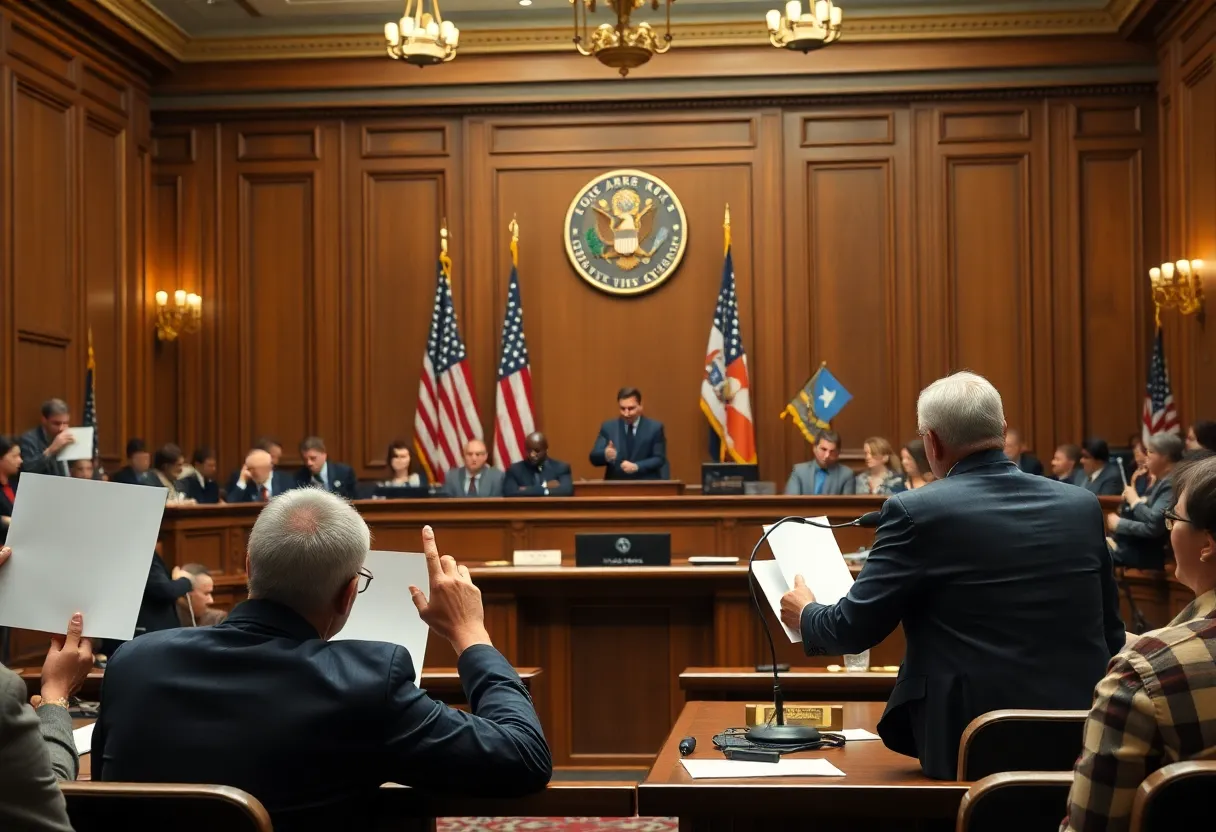

A courtroom debate highlighting the clash over new voting regulations proposed by the Trump administration.
Democratic officials from 19 states have united to challenge President Trump’s executive order on voting processes, claiming it is unconstitutional and could disenfranchise eligible voters. The lawsuit contests new requirements for voting documentation and mail-in ballot rules, asserting these measures threaten democracy and state rights. The controversy has sparked a heated debate over election access, federal intervention, and the future of voting rights in America.
In a bold move, Democratic officials from 19 states, including the Great Lakes state of Michigan, have joined forces to file a lawsuit against President Trump’s recent executive order aimed at reshaping U.S. elections. This lawsuit marks the fourth challenge to Trump’s election overhaul, which was issued just a week ago.
The central components of this lawsuit focus on two key requirements: first, the demand for documentary proof of citizenship when registering to vote, and second, a strict rule stating that all mail ballots must be received by Election Day. Critics argue that such measures could drastically hinder voting access for many eligible voters.
State attorneys general involved in the suit are making a clear case that the President has overstepped his authority, labeling the executive order as unconstitutional, antidemocratic, and fundamentally un-American. The lawmakers express a united front in defending the right of states to manage their own voting processes.
In response, a spokesperson from the White House described the new citizenship requirements as merely common sense and dismissed the Democrats’ concerns as insane. This exchange highlights a growing divide between party lines, particularly as Trump’s executive order addresses what he claims is a lack of adequate enforcement of election security.
Many election officials have consistently stated that recent elections have been among the most secure in U.S. history, contradicting Trump’s assertions that widespread voter fraud influenced his loss to Biden in 2020—claims that have yet to be substantiated by any credible evidence.
One alarming aspect of the executive order is its provision to potentially withhold federal funding from states that do not comply with these new mandates. This level of federal intervention has raised significant concerns among officials in several states. Some states currently allow mail-in ballots to be counted if they are postmarked by Election Day or give voters the chance to correct minor ballot mistakes—both practices that are now under threat from this executive order.
The lawsuit argues that the U.S. Constitution grants states the authority to determine the times, places, and manner of their elections. It further points out that the rules stipulated in the executive order could lead to mass disenfranchisement, particularly for voters lacking the required documents—such as a U.S. passport or a REAL ID-compliant driver’s license.
Complicating matters, many Americans do not have easy access to vital documentation like birth certificates, raising concerns about their ability to comply with new voting requirements. Analysts suggest that around 800,000 voter registrations have already been canceled in Michigan since 2019, indicating ongoing efforts to maintain voter rolls.
In Michigan, Attorney General Dana Nessel has voiced strong opposition to the executive order, considering it a disruptive force to state elections. Meanwhile, voting officials in Nevada stand firm, declaring their methods fair and secure while also resisting what they see as unwarranted federal interference.
The lawsuit was officially lodged in U.S. District Court in Massachusetts, backed by Democratic attorneys general from several states, including California and Arizona. Legal experts warn of the ramifications this executive order could have on millions of eligible voters who might not possess the correct documentation.
The fallout from this executive order extends beyond just legal battles; it calls into question the fundamental principles of democracy and state authority. As the Michigan Supreme Court weighs in on efforts to challenge voter-approved changes to election laws, it becomes clear that the landscape of voting rights in America is in a state of flux, as both sides gear up for what promises to be a significant showdown.
As the situation develops, many citizens and officials alike will keep a close eye on this evolving controversy, a sign of just how critical the debate over voting access and rights has become in modern America.
News Summary DHL Express has announced a temporary suspension of high-value package deliveries to the…
News Summary The importance of patient-centricity in clinical trials is gaining recognition, with industry leaders…
News Summary The Ann Arbor Fire Department is set to commence a complete demolition and…
News Summary Public defender offices in Pennsylvania are facing significant challenges that impede their ability…
News Summary Wanda Beavers, known as 'Mama Tu-Tu,' is transforming her home for the annual…
News Summary Dexter Community Schools is set to present a $242 million bond proposal to…